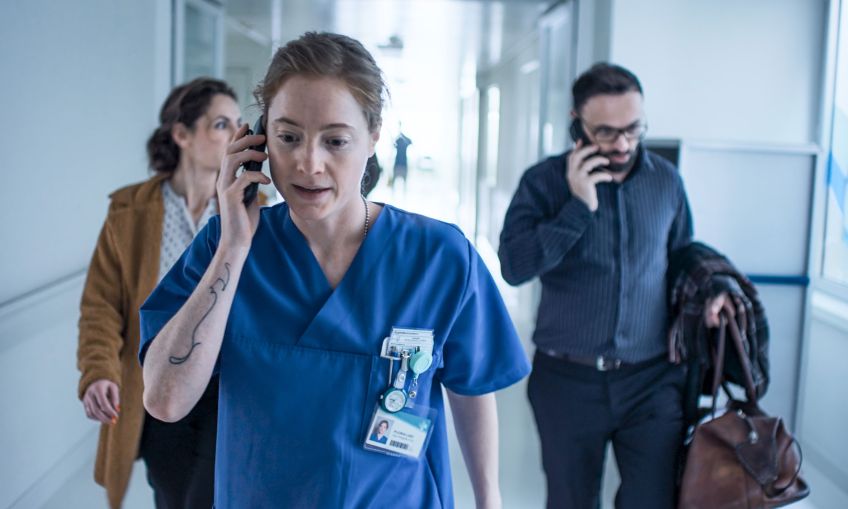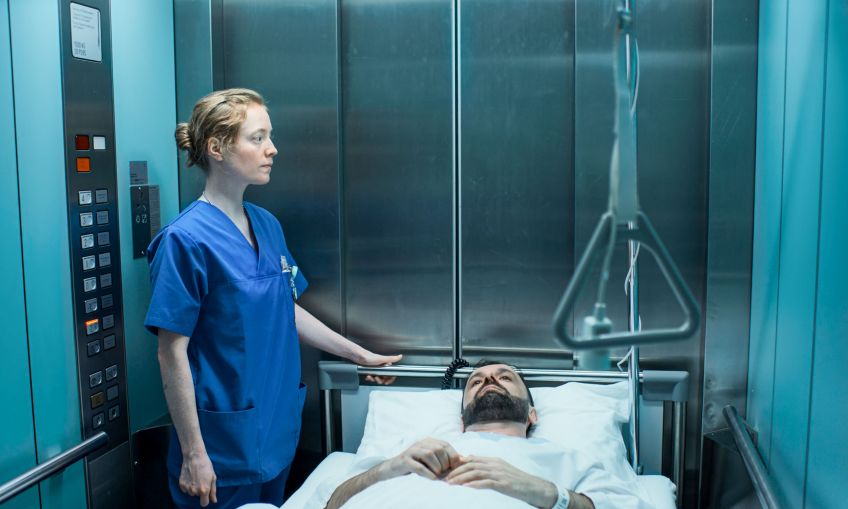Joyce Glasser reviews Late Shift (August 1, 2025) Cert 12A, 92 mins.
General Hospital, 24 Hours in A & E, Casualty, Grey’s Anatomy, The Royal, This is Going to Hurt and Malpractice, to name a few: the UK’s appetite for hospital drama is insatiable. But contrary to what you might think, overworked, underpaid nurses and doctors are neither confined to the UK nor to television series. Swiss-Italian director Petra Volpe (The Divine Order) lifts the genre to cinematic heights in her gripping drama where we follow the sensational Leonie Benesch through a shift in a Swiss hospital.
Not since Sebastian Schipper’s one-take wonder, Victoria, starring Laia Costa, has a charismatic actress carried a film with such non-stop propulsive energy that you’ll be crying out for half time, while too gripped to want one. We leave the hospital with Floria (Benesch), physically drained and ruminating over the dozens of medical and inter-personal decisions she is forced to make during every shift.
From the moment Floria starts her night shift in the surgical ward of the hospital she learns another nurse is off sick and there are some 25 patients to attend to, each one urgent. A student nurse Amelie (Selma) brought in to help, is more trouble than she’s worth.

The patients on this hospital ward have varied backgrounds, family situations and illnesses. The common denominator is that everyone is in pain and needs continual and urgent medical and emotional support.
As Floria flashes down the corridors, with buzzers ringing simultaneously, changing filthy clothing, administering medicine, operating life-saving machines, answering myriad questions and offering human contact, the film becomes a race against every patient’s clock. And these clocks are eternal, and as endless as Floria’s tasks.
But it is the differences between the patients and their reactions to pain that make the film so profound and thought-provoking. Most patients are either reasonable, humble and undemanding given their circumstances. Herr Leu, (Urs Bihler) a lonely man with no visitors, has been patiently awaiting a cancer diagnosis, but never blames Floria who helplessly reassures him while the doctor keeps postponing her appearance.
Frau Bilgen is not the problem; it’s her three sons with unrealistic expectations. They blame Floria when their mother dies alone in the night, oblivious to the guilt Floria is feeling. She would have been holding the dying woman’s hand, but for the cries of the living. Frau Lauber (Elisabeth Roll), though dying of cancer, takes the time to ask Floria about herself, and we learn that Floria is separated. Mrs Lauber says, ‘with a kid, you’re never really separated.’
The fear of dying brings out the worst in people as we see with Floria’s only private patient, the demanding, arrogant Mr Severin (Jürg Plüss). His sense of entitlement is such that he explodes when Floria does not make his pot of herbal tea a priority.
Meanwhile, with the pressure mounting, Mr. Song (Jeremia Chung), suffers a severe allergic reaction to medicine, accidentally administered – Volpe’s non-veiled warning that haste makes waste.
The beauty of Late Shift, however, is that there are no villains if you dig deep enough. When Floria finally loses control and – in a sequence that introduces some welcome cathartic humour – throws Mr Severin’s designer watch out of the window, we see the human side of both nurse and patient in a new light.

The film opens with a shot of an assembly line of medical uniforms clean and pressed out of the laundry, before cutting to a woman, Floria, changing into one as if strapping on armour before a battle that’ll be messy. A colleague asks about Floria’s day off, which was spent with her daughter Emma at the zoo. Schipper is too good a writer to include expository dialogue and the little we learn about Floria, we learn from her actions and decisions, and from such short interchanges for staff and patients.
It’s hard to imagine Late Shift without Leonie Benesch who is in every scene, and almost every shot. She lit up the screen in Michael Haneke’s grim White Ribbon; was blinded by compassion mixed with moral and ethical dilemmas in The Teacher’s Lounge; and is the sharp, overqualified and unflappable translator in September 5. With her emotional intensity and control, Benesch is now the European actress to go to when you need an embattled character struggling to maintain her professionalism.
Nurse Floria’s departure for the challenges of life outside the hospital, are played out by Anohni’s (Anthony and the Johnsons) haunting chant, Hope There’s Someone. The powerful song never tips the film into sentimentality as by now it feels well-earned and in short supply. Nor does the touch of fantasy in the final shot. It is, on the contrary, just what is needed.




